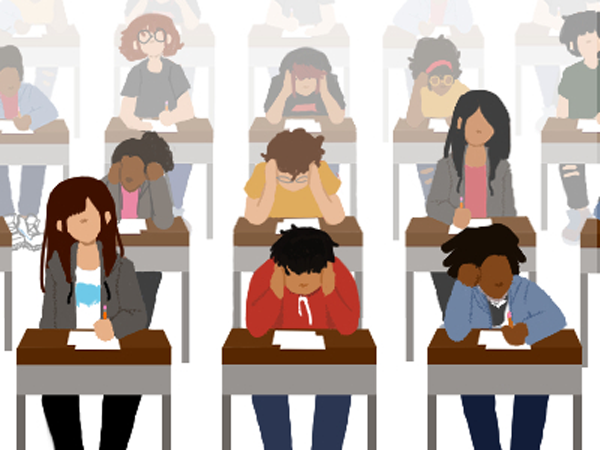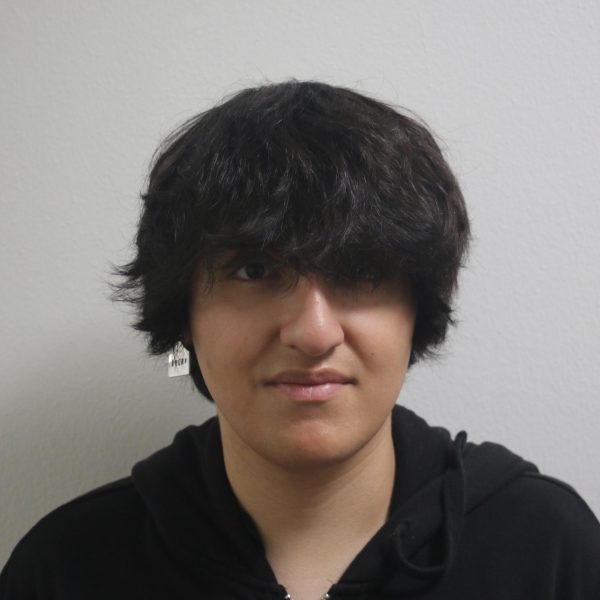Student, faculty emphasize mental health amid final exam pressure

Illustration by April Calvo/The Et Cetera
November 30, 2021
Political science major Hannah Spohn prepares for final exams the moment she steps into the classroom, intent on minimizing the looming fear caused by exams.
“[Stress] builds up. And if you let it build up, you’re going to overflow with stress,” Spohn said. “It’s going to come out [with you] snapping at people or having mental breakdowns.”
At the end of each semester, students like Spohn scramble to refresh themselves on course material learned throughout the class. For some students, final exams mean the difference between failing a class or earning credits towards their major, causing students to juggle numerous study methods.
“I feel as [final exams] get closer, people start to go into panic mode,” Spohn said. “Everything starts to shift into this looming fear in the back of your mind.”
To prepare for her course exams, Spohn uses a variety of study techniques ranging from flash cards to eating chocolate. She also recommends tutors when it’s necessary.
Anand Upadhyaya, the program lead for Eastfield’s Male Achievement Program and the former tutoring coordinator, said students utilize tutoring services more toward the end of the semester.
Uadhyaya said he reminds students that preparing for exams should not come at the expense of one’s mental health.
“We put so much pressure on ourselves,” Upadhyaya said. “We think that if we don’t do well on this exam then I won’t move on, I won’t finish [my] education and I won’t achieve my goal. That’s just not true. We need a little bit of perspective to remember that it’s just one test.”
Since studying primarily involves being immersed in learning material, Upadhyaya said that “tunnel vision” hinders engagement, which can negatively affect learning comprehension.
“I can’t lift weights for four hours. I’m going to injure myself,” Upadhyaya said. “You want to build that same discipline [with studying] where you take breaks.”
Brandi Ragsdale, a counselor at Eastfield, said she provides consultation to an increased number of students during the days leading up to final exams. Upon recognizing a student’s needs, she guides them to a resolution that allows stress relief and academic success.
“One of the things about counseling is that we teach people how to do the counseling themselves,” Ragsdale said. “We teach them how to do their own coping skills.”
Although most students feel exam pressure, the effects are unique. Ragsdale addresses a variety of exam-related issues affecting anxious students.
“I’ll talk to them about where their [exam-related] stress is coming from,” Ragsdale said. “When I figure out where that stress is coming from, I can find the best way to help them.”
Some students forego sleep in favor of additional study time, which can have major consequences. Ragsdale said a lack of sleep can contribute to poor exam performance. Fatigue also places strain on people’s mental health.
Since final exams generally cover the entirety of a class, Ragsdale said several study methods can help students feel less overwhelmed when approaching their course material. Her main advice is for students to break down the course into an outline and learn in segments.
Ragsdale said segmented study sessions are effective at reducing exam pressure while also allowing students to digest course material.
Spohn said she uses this method. Between studying sessions, Spohn relaxes by trying out new hobbies, which she said improves her mental health.
Another issue Ragsdale reported is that pressured students would come in to discuss social issues, whereas studying takes up time that could be spent with friends and family.
“I think it helps to have support more than anything else,” Upadhyaya said. “You can go to the tutors you’re utilizing and start to build a relationship with them. They become someone that’s in your corner.”
In addition to receiving help with learning material, Upadhyaya said tutors can serve as a source of positive feedback and support.
“As much as I like to study and get into the groove, I don’t want it to define my schedule,” Spohn said. “I always make sure that I have someone to talk to every day.”




